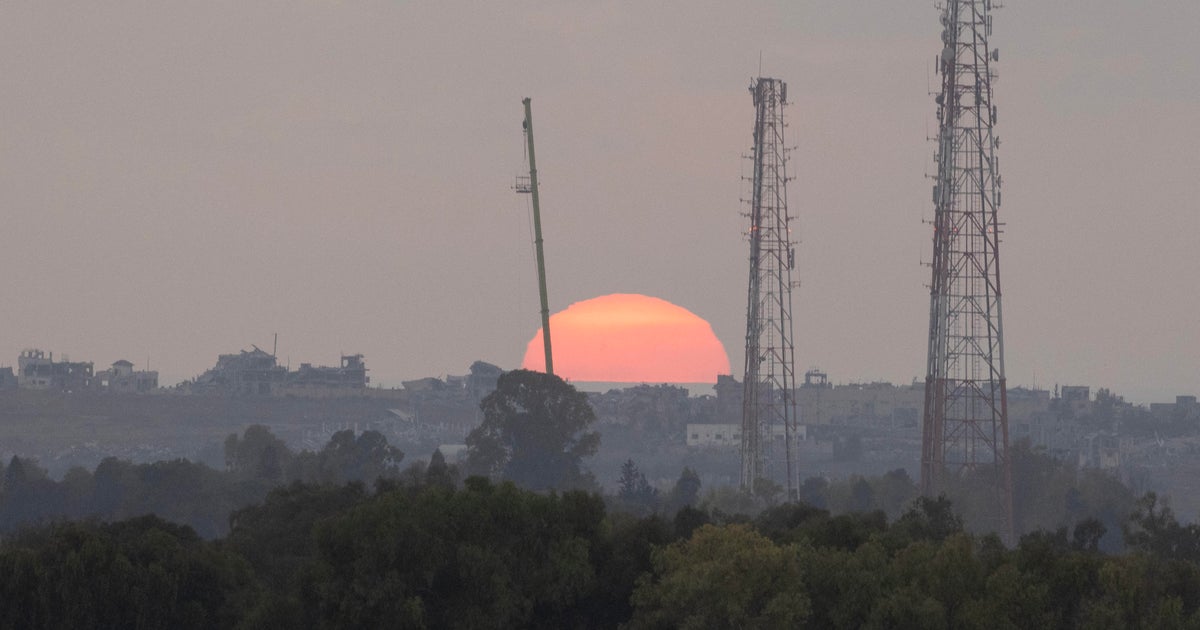CBS News
White House says potential Iran retaliation against Israel could come this week

The Biden administration is preparing for a potential attack on Israel by Iran and its proxies as soon as this week, in retaliation for the recent assassinations of top leaders of Hamas and Hezbollah.
“We have to be prepared for what could be a significant set of attacks, which is why, again, we have increased our force posture and capabilities in the region even in just the last few days,” White House national security spokesperson John Kirby told reporters on Monday.
The Pentagon, which rarely makes public statements on the location of submarines, said Sunday that Defense Secretary Lloyd Austin has ordered the USS Georgia, a nuclear-powered guided missile submarine, to the region. Austin has also ordered the USS Abraham Lincoln carrier strike group to “accelerate” its movement from the Indo-Pacific to the Middle East.
The moves were made, according to the Pentagon, to protect U.S. forces in the region as well as to help Israel defend itself against an anticipated retaliatory attack by Iran and its proxies.
U.S. officials told CBS News that a limited attack from both Hezbollah and Iran could come with little to no warning. Hezbollah is and has been positioned to launch attacks with virtually no warning. Iran has made enough preparations to launch a limited attack with a little warning, potentially coordinated with a Hezbollah offensive.
The administration has been bracing for an attack ever since Iran publicly blamed Israel for back-to-back assassinations of top leaders of Hamas and Hezbollah at the end of July. Israel has claimed responsibility for killing Fouad Shukur, a top Hezbollah commander, in Lebanon, but has not confirmed involvement in the death of Hamas political leader Ismail Haniyeh, who was killed while visiting Tehran on July 31.
In April, Iran launched more than 300 drones and missiles at Israel that did minimal damage, thanks to Israeli air defenses and help from the U.S. and other allies.
This time,U.S. officials are concerned about how Hezbollah’s potential entry into the fight may prompt the wider regional war that the Biden administration has been trying to avoid since Oct. 7, when Hamas attacked Israel, leading to Israel’s retaliation in Gaza. Hezbollah, according to the CIA World Factbook, has an estimated 150,000 rockets and missiles it could use against Israel while Israel is still fighting a war against Hamas in Gaza.
Kirby expressed optimism that cease-fire negotiations could continue this week in Doha, Qatar, to end the fighting in Gaza.
“We fully expect that those talks are going to move forward. And they need to move forward. All negotiators should return to the table and bring this deal to a close,” Kirby said.
CBS News
How to watch the Minnesota Vikings vs. Chicago Bears NFL game today: Livestream options, more

Getty Images
The Minnesota Vikings will take on the Chicago Bears today. The Vikings are currently 8-2, an impressive run so far this season, and will be looking to add a fourth win to their current streak after last Sunday’s 23-13 win against the Tennessee Titans. The Bears, on the other hand, are entering this game on the heels of a four-game losing streak after a tough 20-19 loss against the Green Bay Packers last Sunday.
Here’s how and when you can watch the Vikings vs. Bears game today, whether or not you have cable.
How and when to watch the Minnesota Vikings vs. Chicago Bears
The Vikings vs. Bears game will be played on Sunday, November 24, 2024 at 1:00 p.m. ET (11:00 a.m. PT). The game will air on Fox and stream on Fubo and the platforms featured below.
How and when to watch the Minnesota Vikings vs. Chicago Bears game without cable
You can watch this week’s NFL game on Fox via several streaming services. All you need is an internet connection and one of the top options outlined below.
Fubo offers you an easy, user-friendly way to watch NFL games on CBS, Fox, NBC, ABC, ESPN, and NFL Network, plus NCAA football channels. The Pro tier includes 200+ channels and unlimited DVR, while the Elite with Sports Plus tier adds NFL RedZone and 4K resolution. New subscribers get a seven-day free trial and all plans allow streaming on up to 10 screens simultaneously.
You can watch today’s game with a subscription to Sling’s Orange + Blue tier, which includes ESPN, ABC, NBC, and Fox. The plan offers 46 channels with local NFL games, nationally broadcast games and 50 hours of DVR storage. For complete NFL coverage, add Paramount+ to get CBS games, or upgrade with the Sports Extra add-on for additional sports channels like Golf Channel, NBA TV and NFL RedZone.
Watching NFL games, including Fox broadcasts, is simple with Hulu + Live TV, which includes 90 channels, unlimited DVR storage, and access to NFL preseason games, live regular season games and studio shows. The service includes ESPN+ and Disney+ in the subscription.
Want to watch today’s game live on your smartphone? If so, NFL+ streaming service is the solution you’re looking for. It lets you watch NFL Network and out-of-market games on mobile devices, with an upgrade option to NFL+ Premium that includes NFL RedZone for watching up to eight games simultaneously. Note that NFL+ only works on phones and tablets, not TVs.
CBS News
How to watch the Detroit Lions vs. Indianapolis Colts NFL game today: Livestream options, more

Nic Antaya/Getty Images
The Detroit Lions will face off against the Indianapolis Colts today. The Lions enter this game as top contenders with a near-perfect record of 9-1 so far this season. The Colts, who are 5-6 this season, could have a tough game on their hands against the Lions but will be looking to rack up another win after prevailing over the New York Jets in a tight game last Sunday.
Here’s how and when you can watch the Colts vs. Lions game today, whether or not you have cable.
Here’s how and when to watch the Detroit Lions vs. Indianapolis Colts
The Lions vs. Colts game will be played on Sunday, November 24, 2024 at 1:00 p.m. ET (11:00 a.m. PT). The game will air on Fox and stream on Fubo and the platforms featured below.
How and when to watch the Detroit Lions vs. Indianapolis Colts game without cable
You can watch this week’s NFL game on Fox via several streaming services. All you need is an internet connection and one of the top options outlined below.
Experience NFL action like never before with Fubo’s comprehensive sports streaming platform. From Sunday showdowns to primetime matchups, catch every NFL game across major networks including CBS, Fox, NBC, ABC, ESPN and NFL Network. Choose the Pro package to unlock 200+ channels and limitless DVR storage, or elevate your game-day experience with the Elite with Sports Plus package, featuring NFL RedZone’s commercial-free scoring highlights and stunning 4K quality.
Test drive the service with a no-commitment seven-day free trial, and share the excitement with family and friends — Fubo supports simultaneous streaming on up to 10 devices, so everyone can watch their favorite teams.
You can watch today’s game with a subscription to Sling’s Orange + Blue tier, which includes ESPN, ABC, NBC, and Fox. The plan offers 46 channels with local NFL games, nationally broadcast games, and 50 hours of DVR storage. For complete NFL coverage, add Paramount+ to get CBS games, or upgrade with the Sports Extra add-on for additional sports channels like Golf Channel, NBA TV and NFL RedZone.
Watching NFL games, including Fox broadcasts, is simple with Hulu + Live TV, which includes 90 channels, unlimited DVR storage, and access to NFL preseason games, live regular season games and studio shows. The service includes ESPN+ and Disney+ in the subscription.
Want to watch today’s game live on your smartphone? If so, NFL+ streaming service is the solution you’re looking for. It lets you watch NFL Network and out-of-market games on mobile devices, with an upgrade option to NFL+ Premium that includes NFL RedZone for watching up to eight games simultaneously. Note that NFL+ only works on phones and tablets, not TVs.
CBS News
How to watch the New England Patriots vs. Miami Dolphins NFL game today: Livestream options, more

Getty Images
The New England Patriots will face off against the Miami Dolphins in a game today at the Hard Rock Stadium in Miami. The Patriots have had an uneven season so far, coming into the game with a record of 3-8, including a 28-22 loss to the Los Angeles Rams on November 17. The Dolphins, however, haven’t fared much better this season as they enter the game with a record of 4-6, although they are coming off two wins in a row, the latest against the Las Vegas Raiders last weekend.
Keep reading to find out how and when to watch the New England Patriots vs. Miami Dolphins game today, even without cable.
CBS, Paramount+ and CBS Essentials are all subsidiaries of Paramount Global.
How and when to watch the New England Patriots vs. Miami Dolphins game today
The New England Patriots vs. Miami Dolphins game will be played on Sunday, November 24, 2024 at 1:00 p.m. ET (10:00 a.m. PT). The football game will be shown on CBS and streamed on Paramount+ and the platforms noted below.
How and when to watch the New England Patriots vs. Miami Dolphins game without cable
While CBS is available with many basic cable packages, you’ll have other viewing options, too for the Patriots-Dolphins game. Just understand that the below streaming options will require the use of an internet provider:
Paramount+: Watch CBS-aired NFL games without cable
With Paramount+ you’ll have multiple viewing options to choose from. You can catch NFL games on the Paramount+ Essential tier for just $7.99 each month or you can watch college football with a Paramount+ with Showtime subscription for $12.99 monthly. In addition to live streams of NFL games airing on CBS, you’ll get to watch additional live sporting events including NCAA college football, PGA Tour golf, soccer and more.
Get started with Paramount+ here today.
Amazon Prime Video: Add Paramount+ to your existing subscription
Already have an Amazon Prime Video account? Simply add Paramount+ to your current subscription to watch all the CBS-aired NFL games in addition to Paramount+ originals. The same prices from above apply, depending on which tier you choose. Not sure which is best for you? Don’t worry. Both options come with a free seven-day trial that can help you decide.
Watch the Patriots-Dolphins game on Amazon Prime Video.
Fubo: Watch the Patriots-Dolphins game for free
Looking for an inexpensive way to watch football? Fubo could be the best way to do so. The live TV streamer is currently offering a seven-day free trial and $30 off of your first month’s subscription. Once subscribed, you’ll gain access to all of their live sporting events immediately. And there will be a lot to choose from. Not only does Fubo come with access to NFL games airing on your local CBS channel, it also includes Fox Sunday NFC games, “Sunday Night Football” on NBC, “Monday Night Football” on ABC and ESPN and all of the games that air on the NFL Network. So don’t wait.
Get started with Fubo online now.










